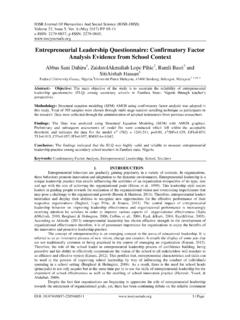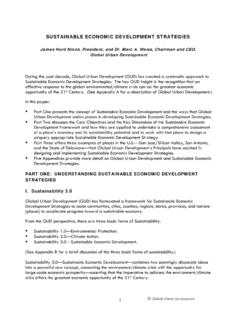Transcription of A Guiding Framework for Entrepreneurial …
1 A Guiding Framework for Entrepreneurial universities Final version 18th December 2012 1 What is a Guiding Framework for Entrepreneurial universities ? This Guiding Framework is aimed at those European universities1 looking for advice, ideas and inspiration for the effective management of institutional and cultural change. It is designed to help interested universities assess themselves against statements which are organised under the following seven areas: Leadership and Governance Organisational Capacity, People and Incentives Entrepreneurship development in teaching and learning Pathways for entrepreneurs University business/external relationships for knowledge exchange The Entrepreneurial University as an internationalised institution Measuring the impact of the Entrepreneurial University These statements are factors likely to be characteristic of the Entrepreneurial University. As a self-assessment tool, the Framework has the simple purpose of helping universities identify their current situation and potential areas of action, taking into account their local and national environments.
2 This is not a benchmarking tool; it is for individual universities to determine their own strengths, weaknesses and find ways forward. For each of the given statements, a university can assess itself on a scale of 0-10 and then use the Guiding Framework and accompanying material as a way of working on areas where improvement is considered a priority. This Framework was produced under the aegis of the European Commission's DG Education and Culture, in collaboration with the OECD LEED forum, and supported by a panel of six independent experts in this field. Why do we need a Guiding Framework for Entrepreneurial universities ? Higher education is facing unprecedented challenges in the definition of its purpose, role, organisation and scope in society and the economy. The information and communication technology revolution, the emergence of the knowledge economy, the turbulence of the economy and consequent funding conditions have all thrown new light and new demands on higher education systems across the world.
3 One significant European response is seen in the development, in concept and in practice, of the Entrepreneurial University epitomised by innovation throughout its research, knowledge exchange, teaching and learning, governance and external relations. The Guiding Framework began as an idea first discussed at the March 2011 University Business Forum; a European Forum which brings together universities and businesses to look at mechanisms for cooperation and encourage the transfer and sharing of knowledge. A group of participants at the event formulated a recommendation to take a closer look at the underlying concepts and characteristics of an Entrepreneurial University and to come up with a Guiding Framework that would be available to universities as a concrete tool for learning and inspiration. The study does not attempt to invent new models and factors but brings together existing, available literature and models, and adapts them for best use in the European Higher Education Area.
4 1 To avoid confusion in this Guiding Framework University is used to mean all types of institutions of higher (third level) education, while students refers to all types and levels of students from Bachelor to PhD. 2 What is an Entrepreneurial University? What does it mean to be an Entrepreneurial University? What are the defining characteristics? Are there already Entrepreneurial universities from which lessons can be learnt? To find a single definition of the Entrepreneurial University which works across the European Higher Education Area is difficult and controversial. There is no one-size-fits-all definition of the Entrepreneurial University, but rather that there is an invaluable plurality of approaches, inventive, creative and yet practical, which distinguish the Entrepreneurial style. There are several attempts to define the Entrepreneurial University in the literature2 and they also reach no consensus. As a consequence this Framework has been designed around seven areas which cover many of the commonly identified features of an Entrepreneurial university.
5 Therefore this Guiding Framework can be used as a model which supports many of the existing definitions. What happens to the results? The results derived from the use of the Guiding Framework belong to the university and are for your own personal/institutional use. The online version will ask users to register but the results will only be available to the registered user. The user can access and use the online Guiding Framework as many times as a they want, either to provide a baseline against which future developments can be measured, or to allow several people to enter data for comparative purposes. The online version can be accessed at the following address: Can I give feedback on the Guiding Framework for Entrepreneurial universities ? The nature of an Entrepreneurial University means this tool cannot be comprehensive but is there to provide guidance and inspiration. Therefore, this Guiding Framework remains a work in progress and feedback is welcomed3. The online version of the Guiding Framework has a feedback section which can be filled in and the responses will be sent back to the European Commission and the OECD.
6 Who can use the Guiding Framework ? The main target audiences are those university staff concerned with strategic planning and decision-making. The Framework can be used, as a formal or an informal exercise, by individuals, or at the faculty or the institutional level. universities may also want to bring together staff in working groups to look at the issues, come to consensus on their position and agreement on areas for improvement. Results should offer some insight into the progress of change in a university, forming the basis of planning discussions, and useful in the formulation of strategic plans. Results might also provide a baseline, against which future developments can be measured. 2 Further guidance and definitions can be found in the documents indicated in the Bibliography. 3 The first version of the Guiding Framework has been devised in cooperation with experts in the field and piloted with a small number of universities covering 17 Member States.
7 3 Supporting material This Guiding Framework also contains a number of references to useful case material taken from the literature and other sources, which can be used as inspiration. They are organised by the areas of the Guiding Framework but many of them fit more than one category. Many are very broad and others relate to very specific initiatives. References and contacts are also provided. 4 1 Leadership and Governance This section of the Guiding Framework explores those factors which relate to the leadership and governance of a university. In order to develop an Entrepreneurial culture in an institution, strong leadership and good governance are crucial. Many universities include the words "enterprise" and "entrepreneurship" in their mission statements but this needs to be more than a reference. This section highlights some of the important factors a university may consider in order to strengthen their Entrepreneurial agenda. 1. Entrepreneurship is a major part of the university strategy.
8 universities should see themselves as Entrepreneurial organisations and environments held together by common values/missions and not detailed control systems. To develop as an Entrepreneurial organisation with an Entrepreneurial culture the Entrepreneurial activities should be established in the strategy. To score highly a university should have a working mission statement with an Entrepreneurial vision for the future of the institution. In addition, the strategy could have specific objectives for entrepreneurship with associated performance indicators ( generating Entrepreneurial motivation, cognition, and attitudes; generating Entrepreneurial competences and skills; support business start-ups; commercialise research results through technology transfers and business start-ups; generate revenues for the institution from spin-off activities; strengthen co-operation between the institution and local firms). 2. There is commitment at a high level to implementing the Entrepreneurial strategy.
9 There has to be commitment to implementing the strategy in relation to the Entrepreneurial agenda. To score highly, the strategy should be known across the institution and understood as a priority by staff and students. The commitment should be shared and supported by internal communication efforts. Another key indicator of commitment is if someone at the level of the Dean or Rector is made responsible for the Entrepreneurial agenda. universities with strong commitment at a high level will revisit and revise strategies to keep them up to date. universities may also have adapted their structures to better deliver the Entrepreneurial strategy. 3. The university has a model for coordinating and integrating Entrepreneurial activities at all levels across the university. There are many different models for coordinating and integrating Entrepreneurial activities across a university. Whichever model is employed, it will take advantage of existing relationships, coordinate across departments, faculties and other centres, and avoid the duplication of work within a university and its local entrepreneurship ecosystem.
10 To score highly, universities should have an entrepreneurship structure in place which co-ordinates activities within the institution and with other stakeholders within the local entrepreneurship ecosystem. 5 5. The faculties and units have autonomy to act. Overcoming bureaucratic barriers is key to entrepreneurship. universities with fewer barriers or hierarchies find it easier to undertake Entrepreneurial activities and speed up idea creation and decision making. New centres and structures for the development of new activities can be formed easily. The institution should maximise autonomy and individual ownership of initiatives. 6. The university is a driving force for entrepreneurship development in the wider regional, social and community environment. universities play several roles in their communities and one of their key functions is to support and drive regional, social and community development. To score highly, universities should be active players, linked to their external environment by having a strong presence in the community.














